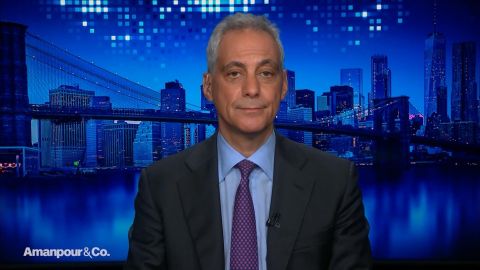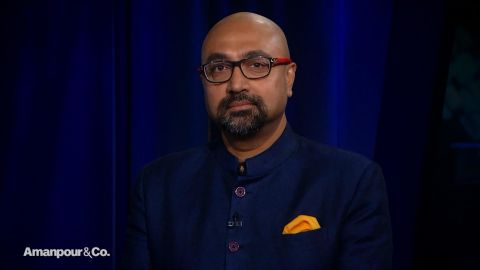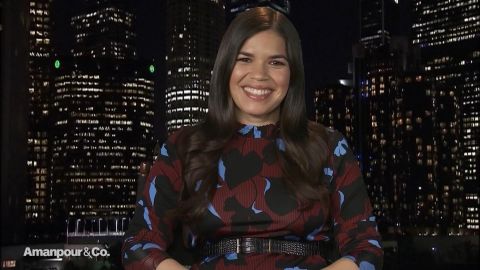Read Transcript EXPAND
CHRISTIANE AMANPOUR: And now we’re going to turn to the new bilingual Netflix drama “Gentefied.” It’s set in Boyle Heights, which is a predominantly Mexican-American Los Angeles suburb. The series follows three cousins and their fight to keep their grandfather’s taco shop open as their neighborhood faces rapid gentrification. The executive producer is actress America Ferrera. She’s best known for her roles in “Ugly Betty” and “Superstore.” Ferrera herself is a first-generation Latina whose parents immigrated from Honduras. And she’s joining our Michel Martin from Los Angeles to discuss how her experiences shape the way she portrays the Latino community.
(BEGIN VIDEOTAPE)
MICHEL MARTIN: America Ferrera, thank you so much for talking with us.
FERRERA: Thank you, Michel, for talking with me.
MARTIN: So, you’re executive producing a new show on Netflix called “Gentefied.” And your “Superstore” has just been renewed. And you’re expecting your second baby. And, in addition to acting, you’re also directing.
(LAUGHTER)
MARTIN: So you’re not busy at all.
(LAUGHTER)
FERRERA: Just normal amount of busy for me, but everything’s great.
MARTIN: So tell me about “Gentefied.” It’s a really special project. Just describe what it’s all about.
FERRERA: It’s a story about a family that lives in Boyle Heights. It’s a neighborhood of East Los Angeles, a very historic neighborhood, very entrenched in Latino culture and organizing and activism. And “Gentefied” uses Boyle Heights as the backdrop to tell this family story that is — but that also really explores the tension between roots and tradition, and also progress and change and moving forward. And the show is called “Gentefied,” because gentefication is when the people of the neighborhood have a lot to do with the changing of the neighborhood. And so for — what that means in a place like Boyle Heights is that young people of my generation whose parents came to this country to give their children more opportunity are part of that change. They go away, get education, get fancy jobs, get lots of opportunity, and come back to their neighborhoods, because that’s where they’re from, but control due to the changing of it.
MARTIN: The focus is a family that has run a taco restaurant, and it’s a neighborhood spot. But it’s challenged. I mean, it’s challenged by rent increase. It’s challenged by the fact that that neighborhood is changing. They’re trying to figure out, like, what do we do? Like, what do we hold on to? What do we change?
FERRERA: Right.
MARTIN: I want to play a clip. It’s the grandfather, who’s the patriarch. And he’s talking to his granddaughter, Ana, who is trying to be an artist, and she’s also helping out with the business. And she’s trying to sort of make her way as an artist, even as she’s trying to help him hold onto the business. So we will play that clip, and then we will talk a little bit more.
(BEGIN VIDEO CLIP, “GENTEFIED”)
UNIDENTIFIED ACTOR (through translator): Change is something very hard to do. Old folks like me don’t like it. But Ofelia will come around. Maybe that mural will help her. Maybe it won’t. Maybe charging chips will help. Maybe it won’t. But we need to try, mija. What doesn’t feel good is being treated like you can’t handle your own business, as if you’re some idiot who can’t make her own decisions. That’s a matter of respect. You have to give her the respect that gringo will not.
UNIDENTIFIED ACTRESS: All I wanted was to do what I loved without having to worry about money.
UNIDENTIFIED ACTOR (through translator): Me too, mija. Me too.
(END VIDEO CLIP)
MARTIN: Oh, I love this clip so much, because the grandpa speaks in Spanish, and granddaughter answers in English. He wants to hold onto his business, and he’s not really sure how. But every time somebody suggests that they change something, he gets mad. How did you come up with the tone of this? How did you know what you were going for?
FERRERA: Well, our show creator is Marvin Lemus and Linda Yvette Chavez, two young Latino writers, creators. They created this world on the page. And it’s based on their family, their moms, their aunts, their uncles, their cousins. And I remember reading the scripts and laughing so hard and crying at the same time and feeling the heart and the warmth that I really recognized in my own family and in my own life experience. And, also, we’re used to seeing our communities portrayed in very polarizing ways, where either broad, comedic jokes that don’t resonate with me, or it’s gritty and it’s raw and it’s all the drug-riddled gangbanging grit. We never get to be other things. We never get to be funny and hilarious and stylish and smart and witty and all the other parts of the scale of human dimension. And thank you for showing that clip. Joaquin Cosio, who plays our grandpa, our pops in the show, is just such a phenomenal actor, who he himself, like, talks about what this role meant to him, because he’s always played the drug dealer, the gangbanger, the bad guy. Like, they don’t — there aren’t opportunities for him to play roles that show other colors for him. And he has spoken personally about how, for him, this is him telling the story of his father, what his father went through and gave up to pursue a better life for him and his family.
MARTIN: I want to play another clip. And you’re in this one, you won’t be shocked, where grandpa’s trying to hold onto his taco restaurant in the face of a big rent increase that he’s really struggling to pay. So he goes to get advice from you. And I believe, in this, you play like a lawyer, like a tenant’s rights lawyer that they go to get some advice from.
FERRERA: Yes. Yes.
MARTIN: So let’s just play that clip, and I want to talk a little bit about that.
(BEGIN VIDEO CLIP, “GENTEFIED”)
UNIDENTIFIED ACTOR: Reads a few books, now he thinks he is Ruth Bader Ginsburg. I read all about her in my women’s studies class at Boise State. That’s where I got my degree in business.
FERRERA: Is that — you’re done?
UNIDENTIFIED ACTOR: I’m done.
FERRERA: Well, Erik is asking all the right questions. California is a tenant state. So he can give you an eviction notice, but as long as you’re complying with his demands within the allotted time, then you’re good. Landlords like to pull the scare tactic often. Now, in order to prevent a future detainer or a forced eviction via court, just pay your rent on time. That’s it.
UNIDENTIFIED ACTOR: That’s it?
FERRERA: Mm-hmm.
UNIDENTIFIED ACTOR (through translator): Well, that’s great. Thank you so much, Ms. Cruz. God bless you. Look, I don’t know how to thank you, mija, but–
UNIDENTIFIED ACTOR: Oh, Jesus, pop.
UNIDENTIFIED ACTOR (through translator): I hope you like carnitas.
UNIDENTIFIED ACTOR: Seriously?
FERRERA: No, I — getting paid in carnitas is OK by me.
(END VIDEO CLIP)
MARTIN: So, it’s so sweet, because here, again, the subtleties here. First of all, Chris, he’s the young aspiring chef. He’s aspiring to be a classically trained chef and go and get a really expensive sort of culinary education. He’s aspiring to get like Michelin stars and get that kind of claim. And Erik’s just trying to kind of hold on to things to help his grandpa hold onto things.
FERRERA: Yes.
MARTIN: And they’re both trying to help. One of the things that I sort of appreciated about this is, you showed sort of the awkwardness of the not fitting in, as you talked about, that feeling like you’re neither here nor there.
FERRERA: Yes.
MARTIN: I was really intrigued by this, because it seems as though a lot of these kinds of programs that are aimed at — quote, unquote — “ethnic audiences,” often, they’re choosing sides. Like, one person has to be the good person, right, and one person has to be the bad person.
FERRERA: Yes. We’re not one bloc. Like, we have such varied experiences of being Latino and what that means. And Chris is the cousin whose father moved to Idaho, like, moved his son to Idaho, and he grew up in Idaho. And now he’s back in this neighborhood that he was originally from and couldn’t feel more out of place. And that is a very true experience for a lot of us who, for whatever reason, we weren’t surrounded by our culture outside of our home. We had to adapt and assimilate to whatever circumstances we found ourselves in. And Chris is definitely having that experience as he returns to Boyle Heights, trying to reconnect to a past version of his life and to a past identity. And they don’t make it easy for him. His own family doesn’t make it easy for him.
MARTIN: Did that ever happen to you?
FERRERA: Oh, all the time, yes. Girls in school would talk about me in Spanish like right in front of me and just assume that I didn’t speak Spanish, because I didn’t dress like them or talk like them or I didn’t ride the bus to school with them. So people assume all kinds of things about you. And the experience I was speaking to is one where — in my own family. Like, speaking Spanish and making mistakes in Spanish, you would get made fun of. So it would make it that I didn’t want to speak Spanish, because I didn’t want to make mistakes and I didn’t want to be called a white girl, and I didn’t want to be made fun of at home. But then I go to school or to hang with the neighborhood kids, and I wanted to fit in there too. And so you kind of — you couldn’t go right in either place. But the family making fun of you, and making fun of your assimilation and your adaptation, is a very authentic experience to me, and one of that’s a bit confusing, because, in large part, the messaging is, go forth, assimilate, succeed, do what you have to do to make the most of these opportunities we gave you, and we might make fun of you along the way. So, that certainly is true how — for how it worked for me in my childhood and growing up.
MARTIN: But, in the series, it also makes the point that, at some point, people need the knowledge and expertise that has been gained by people who have kind of left the community, right? I mean, doesn’t — isn’t that part of it, too?
FERRERA: I think it makes the point that there’s different kinds of knowledge and that all of our experiences are valid. And I think that’s something that I haven’t experienced as a Latina American, that my experience of being Latina is a valid one, too. We all have different experiences of our identity, and we’re all struggling with what that identity is, individually and collectively. And Erik stayed in Boyle Heights because he didn’t have a choice, and he’s making the best out of what he has. But he’s also in a relationship with a young, amazing, intelligent woman who went to Stanford and also chose to come back to Boyle Heights and be rooted back in her community. And you mentioned Ana before, whose deep desire is to be an artist, and her many identities create struggle for her, because she’s queer. And that obviously creates some tensions in her relationship with her family and her mom, but it creates tension in her identity as a Latina, because, sometimes, her Latina-ness is not accepted in her queerness and vice versa.
MARTIN: So let’s go back and talk about you for a minute. You have been at this for a long time. And I sense that this is a real kind of passion project for you and something that you feel really strongly about and really close to. Do you remember that, when you started out, is this what you thought it would be like? Is this what you hoped for?
FERRERA: To be perfectly honest, I never thought about my Latina identity. I was just who I was. And it wasn’t really until I started auditioning and acting and getting cast in roles that I realized that, even if I didn’t see it, people saw it when they looked at me, and that there was no escaping that part of my identity, particularly when it came to what characters I could play and what kind of characters people saw me as. I was lucky enough to get to start in “Real Women Have Curves” as the first film I ever did, which also took place in Boyle Heights, by the way. And all I wanted at 17 was to live my dream. Like Ana said, like all I want to do is do what I love. And I think, at 17, when you realize that you are representative of millions of other people, that can be daunting. It can be hard to wrap your mind around of people see themselves in me, or when I speak or when I act or when I take on a role, it’s not just me out there. It’s millions of Latinos like me who’ve never seen themselves, millions of women like me who’ve never seen themselves in this way. But I think, as I have grown in my career and as a person, it no longer feels like a responsibility. It feels like a deep privilege and a deep desire of mine to use whatever access I have to create more opportunity and more space for new kinds of stories and new kinds of portrayals to exist.
MARTIN: Where did the directing come in? Is that part of that, of trying to give space for other people? Because, in addition to performing, you have now started directing. You have directed a couple of episodes of “Superstore.” You have also directed a couple of episodes of this series as well. What motivates that?
FERRERA: The push that I needed to overcome any hesitation or fear about taking that step definitely came from seeing other women around me do it, seeing other actresses sort of step up and take on that role, watching Eva Longoria direct on TV shows she was acting in or producing, watching Amy Poehler and Lena Dunham, and just watching other actresses step into those roles and be wonderful at them, and turn back, and give me the encouragement that I could, in fact, do it. And, also, I think what helped me get over the fear of asking for that opportunity did come from me realizing that, if I, with all of my access and all my opportunity and all my experience, if I couldn’t break that barrier, then how could I expect the young women and young people of color behind me with so much less opportunity and access to overcome their fears and step up and claim something that they wanted as their own?
MARTIN: And where does the activism fit in to this vision? How did that start for you? It’s interesting, because, on the one hand, we’re very accustomed now to celebrities being active, particularly politically. On the other hand, they often get pushback for it. People are like, who do you think you are? Take a seat. How do you decide what you’re going to get involved in? And how do you see yourself as an activist? Where does it kind of fit into your sense of yourself?
FERRERA: Well, for me, it’s always been a part of who I am. I have always been deeply curious and involved and engaged in the world around me and in my community just as a person in the world. I claim my right to be interested and engaged and use whatever platform I have to do what I want with it. And I think, whether you’re a plumber or a teacher or an actor or a poet, that your job title doesn’t take away your right as a human being to be engaged in the world around you.
MARTIN: Obviously, some people are very well-known for their political activism. But other women have told me, very — particularly members of historically marginalized communities, that they have had to think long and hard, because they have had fears that they will be blackballed or deprived of opportunities. And I just have to ask you if you have ever had that fear, and how did you address it?
FERRERA: Well, I think that those fears are real and rooted and are valid. But, like I said, I didn’t become an actor and then gauge what my — what my engagement in the world was going to cost me as an actor. I was an engaged human being and person in the world long before I had an acting career. So, I didn’t — I never — I personally never felt like I had to relinquish a part of who I was to take on this career. So, for me, it — there was never an America, the actress, without America, all the other things, including my activism and my interest in the world. And I’m also an artist because I’m deeply curious and engaged in the world.
MARTIN: America Ferrera, thank you so much for talking with us.
FERRERA: Thank you so much.
About This Episode EXPAND
Former mayor of Chicago Rahm Emanuel discusses the 2020 election and explains why he thinks mayors are running the world. Journalist Bobby Ghosh breaks down the outcomes of President Trump’s official state visit to India. Actress America Ferrera tells Michel Martin about “Gentefied,” the new show she’s executive producing.
LEARN MORE


